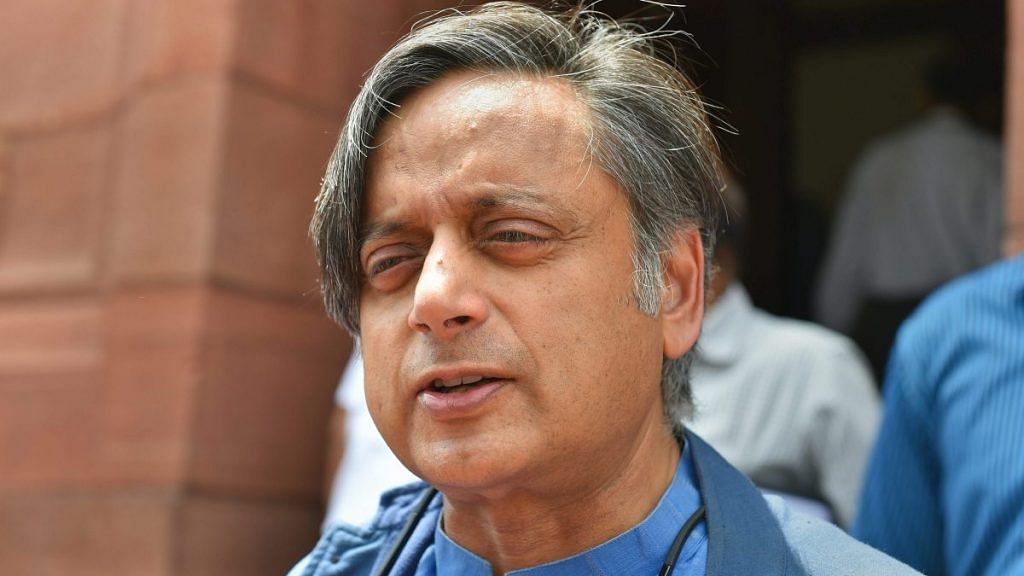Shashi Tharoor has displayed the dexterity and flexibility of a skillful politician by making a U-turn on Sabarimala.
It is with great anguish and dismay that I pen this rebuttal to Shashi Tharoor’s latest piece in ThePrint, where he goes to great lengths to explain his conservative position on Sabarimala. As someone who looked up to Tharoor as a wordsmith and public intellectual, he has let me and a lot of others down with this exposition. It wouldn’t be going too far to describe Tharoor’s position on Sabarimala as woefully hypocritical.
To put things in context, Tharoor’s decade-long political innings has largely remained blemish-free from an ideological standpoint. He has, on most occasions, stayed true to his liberal self even in his political avatar, both in the government and in the opposition. In fact, Tharoor’s naiveté and forthrightness as a politician had occasionally got him in trouble, even earning him the censure of his party bosses. However, in choosing to do a volte-face on his original position on Sabarimala, Tharoor has eventually displayed the dexterity and flexibility of a skillful politician.
Tharoor had spoken up for gender parity in Sabarimala long before the Supreme Court’s verdict last September. As early as February 2016, when the Congress-led United Democratic Front (UDF) government led by Oommen Chandy had submitted an affidavit in the court against the entry of women, Tharoor had taken a divergent position from his party colleagues in Kerala.
Also read: Forgive me liberal friends, but I can’t completely overlook faith of Sabarimala devotees
When the Constitution Bench of the Supreme Court delivered its verdict on 28 September, Tharoor immediately hailed it. Later, speaking at the Indian School of Business in Hyderabad on 3 October, he reiterated his stand by drawing a parallel between the historic temple entry proclamation in the princely state of Travancore in 1936 and the verdict of the day. “Every time a historic change came, there were a lot of traditionalists who resisted,” Tharoor said at the event.
So, what prompted the “instinctive liberal” in Tharoor to betray his instincts and join the ranks of the “traditionalists”?
Tharoor seems to have developed second thoughts on Sabarimala after weighing his chances on getting re-elected from Thiruvananthapuram. The simmering public sentiment against the Supreme Court judgment was becoming apparent and Tharoor’s individual position was largely at odds with his “savarna” constituents in Thiruvananthapuram.
In fact, Tharoor admits as much in his piece.
“Forgive me for pointing out that few, if any, of my critics have faced an electorate, let alone sought to fulfil one’s ideals within the framework of the politically possible.”
And this is where Tharoor failed the liberal in him. While it did not come as a surprise that many of his fellow Kerala Congress leaders adopted a reactionary position, Tharoor was expected to stick to his stand. In fact, unlike many of his peers, Tharoor could well have gotten away with it. In doing so, he would have been upholding the central leadership’s (read Rahul Gandhi) position in this case. Tharoor could also have leveraged his unique standing as a national politician and his skills as a career diplomat to reconcile the two divergent viewpoints within his party as well as outside to emerge as a larger figure.
By siding with the reactionary elements, Tharoor and his party are relinquishing the rich legacy of the Indian National Congress, which championed social reforms in Kerala. It is in public records that the Vaikom Satyagraha (1924-25) – a precursor to the temple entry proclamation of 1936 – was set in motion through the resolution passed in the 1923 Kakinada Congress.
Also read: How saviours of Ayyappa are gaslighting women over Sabarimala
Tharoor makes a silly argument when he says that the entry of Dalits in temples in 1936 was championed by “co-religionists of other castes” and contrasts it with the absence of a mass movement by women to demand entry into Sabarimala. Tharoor is being economical with truth here as he is very well aware that even the “Savarna” Nairs had only graded access (they weren’t permitted into the sanctum sanctorum) to temples till 1936. Ezhavas too had to position themselves beyond the outer walls.
And then he further goes on to say that women of reproductive age who wish to go to Sabarimala today are motivated by “curiosity” than faith. It can be similarly argued that the people (including politicians and social reformers) who championed the rights of the “lower castes” to enter temples back in the day were neither god-fearing nor had ulterior motives.
Also read: Why Sabarimala issue leaves instinctive liberals like me torn: Shashi Tharoor
By advocating the primacy of faith over constitutional morality, Tharoor makes a dangerous argument that may come back to haunt him on the question of Ayodhya. When he argues that his party would “pursue the matter only through constitutional means”, Tharoor may not really have contended with the fact that even a law would not stand judicial scrutiny if it is in violation of the fundamental rights enshrined in Constitution.
Tharoor lists several instances of championing progressive causes and women’s issues to burnish his liberal credentials. One can only say that liberalism is an article of faith and it cannot be applied selectively. When in doubt, Tharoor needs to merely ask himself what his idol Nehru would have done in his place. I rest my case.
The author is a columnist and political commentator.
